The push for sustainability is more than just a trend. Now, more than ever, companies of all sizes and types are grappling with how to be sustainable while maintaining quality standards and meeting customer needs. The new reality is that being sustainable has become one of those customer needs – a basic expectation.
New examples of sustainable initiatives and messaging around them seem to pop up in our feeds daily.
- There are the obvious “green” initiatives. Companies communicate on moves to green energy, trees saved, emissions avoided, plastics no longer in use, and long-term plans to continue on that path. In this same area, we see common messaging around corporate donations made to environmental causes and conservation efforts.
- We see new business models emerging as market disruptors. Don’t want to buy or lease a car? You can now rent one. Don’t like shopping or doing laundry? Start renting your clothes. These are just a couple examples of new solutions to old problems that put sustainability at the forefront.
- Beyond sustainable products and services, we now see packaging itself as being sustainable in many cases. This means more than recyclable, but truly re-usable – either for the same purpose or repurposed in some way. In practice, what this means to the end consumer… if you’re dining in, don’t expect to be served your coffee in a disposable to-go cup much longer.
Why does this matter? Sustainability is impacting customer perceptions and decisions and will continue to play a greater role in the future. Here are some questions every company will have to answer:
- How can sustainability be leveraged for customer acquisition? How can we use it to build greater customer loyalty?
- What is the risk of NOT offering sustainable solutions?
- How should we communicate the sustainability of our solutions? What is the risk of not actively communicating our position on it?
- Sustainability initiatives require investment. Do customers expect to foot a portion of the bill? How much is buying sustainable products and services worth to them?
The answers to these questions impact both the way your company is viewed by customers and prospects, and the decisions they make related to your brand.
The market segment that values sustainability is growing, and these customers place varying degrees of importance on it. As sustainability continues to play a larger role in customer decisions, both the portion of customers who consider sustainability and its influence on their decisions are on the rise. In short, sustainability matters today, and will continue to matter more in the future.
With that in mind, here are five recommendations for companies to build a strong(er) sustainability strategy if this is a priority for your business:
1. Consider where you may emphasize sustainability in your products and services: Develop products and services that are sustainable and communicate the benefits of using them to your customers. Use sustainable materials or designing products that can be reused or recycled.
2. Communicate your sustainability efforts: Actively communicate your company’s sustainability efforts to your customers. Use your website, social media, and other marketing channels to inform customers about your sustainable practices and initiatives; leverage this to build brand loyalty and attract new customers who prioritize sustainability.
3. Embed sustainability in your corporate culture: Sustainability should be a core value of your company and integrated into all aspects of your business, including operations, procurement, and employee training. This can help ensure that sustainability is a priority throughout your organization.
4. Collaborate with other organizations: Learn from others, share best practices, and build stronger sustainability initiatives. Consider joining industry groups, participating in sustainability conferences, or partnering with other companies to develop sustainability programs.
5. Consider the financial implications of sustainability: Look beyond the initial investment to take into account the longer term financial benefits, such as cost savings from reducing waste or energy consumption.
Can you answer these questions about your company’s sustainability strategy?
If not, maybe it’s time to start thinking about them. KS&R can help; we have extensive experience in determining the impact sustainability can have on customers and the way they engage with your brand. Contact us here for more information.


